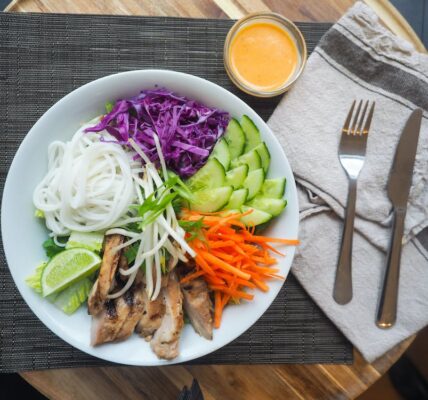Appendicitis is a painful and potentially serious medical condition that occurs when the appendix, a small, finger-shaped pouch located in the lower right abdomen, becomes inflamed and infected. While appendicitis is often attributed to factors like infections or blockages in the appendix, there is growing evidence to suggest that diet can also play a significant role in its development. In this comprehensive guide, we’ll explore the foods that can cause appendicitis and provide you with valuable insights on how to protect yourself through dietary choices.
Understanding Appendicitis
Before delving into the dietary aspects, let’s briefly understand what appendicitis is. The appendix is a vestigial organ, which means it doesn’t have a clear function in the human body. However, when it becomes inflamed, it can lead to severe pain and complications. Appendicitis typically presents with symptoms like:
- Abdominal pain: This often starts around the navel and then shifts to the lower right side of the abdomen.
- Loss of appetite: You may find it difficult to eat due to the pain.
- Nausea and vomiting: These can be common symptoms of appendicitis.
- Fever: An elevated body temperature may accompany other symptoms.
If you experience these symptoms, it’s crucial to seek immediate medical attention, as untreated appendicitis can result in a burst appendix, leading to a life-threatening infection.
The Role of Diet in Appendicitis
Dietary choices can have a profound impact on our overall health, and emerging research suggests that they can influence the development of appendicitis. Here are some key foods to be cautious of:
1. Processed Foods
Processed foods, characterized by their high levels of preservatives, salt, and unhealthy fats, can disrupt the digestive system and potentially lead to inflammation of the appendix. These foods often lack the essential nutrients needed for proper digestion and can contribute to gastrointestinal issues. Limit your consumption of items like fast food, packaged snacks, and sugary treats.
2. High-Fat Foods
A diet rich in high-fat foods, particularly those containing trans fats, has been linked to an increased risk of appendicitis. Trans fats are known for their inflammatory properties, and their consumption can lead to inflammation in various parts of the body, including the appendix. To reduce your risk, opt for lean protein sources such as chicken, turkey, and fish, and choose healthy fats like avocados, nuts, and olive oil.

3. Low-Fiber Foods
A low-fiber diet can slow down the digestive process and increase the likelihood of blockages in the appendix. Sufficient fiber consumption is vital to uphold the well-being of your digestive system.Incorporate more fiber-rich foods into your daily meals, including whole grains, fruits, vegetables, and legumes. These foods promote regular bowel movements and help prevent blockages that can lead to appendicitis.
4. Dairy Products
While dairy products are a valuable source of calcium and other essential nutrients, excessive consumption of full-fat dairy items may contribute to inflammation in some individuals. If you are prone to digestive issues or have a family history of appendicitis, consider choosing low-fat or lactose-free alternatives. Yogurt with probiotics can be a particularly good choice, as it supports gut health and may reduce the risk of inflammation.
Foods to Include in Your Diet for Appendicitis Prevention
Preventing appendicitis involves not only avoiding problematic foods but also incorporating those that support digestive health and overall well-being. Here are some foods to include in your diet:
1. Probiotic-Rich Foods
Probiotics are beneficial bacteria that promote a healthy gut microbiome, which plays a crucial role in digestion and immune function. Incorporate foods rich in probiotics, such as yogurt, kefir, kimchi, sauerkraut, and kombucha, into your daily meals.These foods can help maintain a balanced gut environment and reduce the risk of inflammation in the appendix.
2. Fiber-Rich Choices
Fiber is a dietary superhero when it comes to digestive health. It adds bulk to your stool, promotes regular bowel movements, and reduces the risk of blockages in the appendix. Incorporate plenty of fiber-rich foods into your meals, such as:
- Whole grains: Choose whole wheat bread, brown rice, quinoa, and oats.
- Fruits: Apples, pears, berries, and citrus fruits are excellent sources of fiber.
- Regarding vegetables, leafy greens, broccoli, carrots, and sweet potatoes offer a substantial fiber content.
3. Lean Proteins
Opt for lean sources of protein, such as skinless poultry, lean cuts of beef or pork, and fatty fish like salmon or trout. These protein sources are easier on your digestive system and reduce the workload on your appendix.

4. Hydration
Staying well-hydrated is essential for maintaining a healthy digestive system. Water helps lubricate your intestines, ensuring smooth digestion and reducing the risk of blockages. Aim to drink an adequate amount of water throughout the day, and consider adding herbal teas and clear broths to your fluid intake.
Conclusion
In conclusion, while appendicitis can be influenced by various factors, diet plays a significant role in its development. By avoiding processed foods, high-fat options, and excessive consumption of full-fat dairy products, and by incorporating a diet rich in probiotics, fiber, lean proteins, and hydration, you can reduce your risk of developing this painful condition. Remember that a healthy diet is not only crucial for preventing appendicitis but also for overall well-being. Make thoughtful dietary choices to protect your appendix and support your digestive health. If you have specific dietary concerns or medical conditions, it’s advisable to consult with a healthcare professional or a registered dietitian for personalized guidance.



